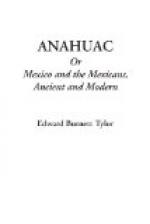CHAPTER XI.
PUEBLA. NOPALUCAN. ORIZABA. POTRERO.
[Illustration: VIEW OF THE VOLCANO ORIZABA.]
We reached Puebla in the afternoon, and found it a fine Spanish city, with straight streets of handsome stone houses, and paved with flag-stones. We rather wondered at the pasadizos, a kind of arched stone-pavement across the streets at short intervals, very much impeding the progress of the carriages, which had to go up and down them upon inclined planes. In the evening we saw the use of them however, for a shower of rain came down which turned every street into a furious river within five minutes after the first drop fell. For half an hour the pasadizos did their duty, letting the water pass through underneath, while passengers could get across the streets dryshod. At last, the flood swept clear along, over bridges and all; but this only lasted a few minutes, and then the way was practicable again. The moveable iron bridges on wheels, which are to be seen standing in the streets of Sicilian cities, ready to be wheeled across them for the benefit of foot-passengers whenever the carriage-way is flooded, are on the whole a better arrangement.
We should never have thought, from looking at Puebla, that it had just been undergoing a siege; for, beyond a few patches of whitewash in the great square, where the cannon-balls had knocked the houses about, there were no traces of it.
We made many enquiries about the siege, and found nothing to invalidate our former estimate of twenty-five killed,—one per cent of the number stated in the government manifestos. Among the casualties we heard of an Englishman who went out to see the fun, and was wounded in a particularly ignominious manner as he was going back to his house.
Revolutions and sieges form curious episodes in the life of the foreign merchants in the Republic. Their trade is flourishing, perhaps,—plenty of buyers and good prices; and hundreds of mules are on the road, bringing up their wares from the coast. All at once there is a pronunciamiento. The street-walls are covered with proclamations. Half the army takes one side, half the other; and crowds of volunteers and self-made officers join them, in the hope of present pillage or future emolument. Barricades appear in the streets; and at intervals there is to be heard the roaring of cannon, and desultory firing of musketry from the flat roofs, killing a peaceable citizen now and then, but doing little execution on the enemy.
Trade comes to a dead stop. Our merchant gets his house well furnished with provisions, shuts the outer shutters, locks up the great gates, and retires into seclusion for a week or a fortnight, or a month or two, as may be. At the time we were there he used to run no great risk, for neither party was hostile to him; and if a stray cannon-ball did hit his house, or the insurgents shot his cook going out on an expedition in search of fresh beef, it was only by accident.




